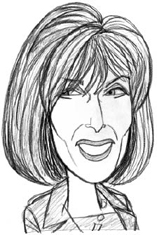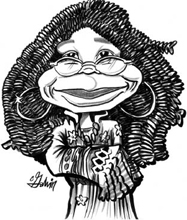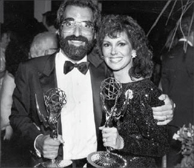Growing Up Laughing: My Story and the Story of Funny (27 page)
Read Growing Up Laughing: My Story and the Story of Funny Online
Authors: Marlo Thomas

Elaine:
It doesn’t matter to me.
Marlo:
What does matter to you, Elaine?
Elaine:
Money. Living forever. And there’s a third thing.
Marlo:
Money matters to you?
Elaine:
Look, I don’t want to go on with this unless you promise me you’ll cut those answers out of the interview.

Marlo:
All right.
Elaine:
You promise? You will?
Marlo:
You have my word as a reporter. Now let’s go on to another question. Are you working on something now?
Elaine:
I . . . uh . . .
Marlo:
You’d rather not say? Have I hit a nerve? I know when you shimmy your shoulders like that I’ve made you uncomfortable.
Elaine:
Yes, it would be better for me not to say what I am working on now.
Marlo:
Well, what’s left? How about your personal life? What’s the most important thing to you, personally?
Elaine:
Grooming. Lifestyle. A well-decorated and gracious home.
Marlo:
Well, that’s not true. I’ve seen the way you dress and I’ve been to your apartment.
Elaine:
Look, you want me to expound on your questions and then you argue with everything I say.
Marlo:
But it’s not the truth.
Elaine:
Well, nobody tells the truth in an interview. Except people who have never been interviewed. And they only do it once.
Marlo:
Elaine,
Interview
magazine has given me the responsibility of doing this with you. I can’t knowingly hand in answers that I know are lies.
Elaine:
Why not? Don’t you tell lies in interviews?
Marlo:
Of course I do. But I’m not being interviewed now. I’m interviewing. I’ve been given a sacred trust. For this moment in time, I am the media. And as my friend, I’d like you to help me.
Elaine:
I have helped you. Now I’m going to eat.
Marlo:
All right. Well, then, I’ll just wind up here. You say you were surprised at “the power of my acting . . .”
Elaine:
Yes.
Marlo:
Well, at least I got the truth out of you twice.
It is nearly impossible not to love Whoopi Goldberg, and a good reason for that is because she’s both unusually hilarious and hilariously unusual. That voice that buzzes like an alto sax, those killer sidelong glances. Comic talent is rewarded and awarded in many ways but rarely with an Academy Award. Whoopi vaulted over that barrier when she captured the Oscar for
Ghost
more than twenty years ago, with her portrayal of a brazenly phony psychic. It was just one of the countless compelling characters she’s been inhabiting for the span of her career. And each one has spoken to our common humanity—our dreams, our fears, our deepest secrets. I’ve never forgotten the little girl Whoopi summoned up in her first big stage show—the one who dreamed out loud about wanting to be beautiful. I knew from the first line that Whoopi was telling me a little bit about myself.
—M.T.
“Normal is nothing more than a cycle on a washing machine.”
—Whoopi Goldberg
W
hoopi:
When I was born, upon emerging from my mom, I found the light and put my face up into it and smiled—half in and half out. I’ve been that way ever since. I live in a very strange and wonderful world in my head.
It all began with my mother and her funny accents. When I was little, my mom and her cousin Arlene did dialects all the time, just to make themselves laugh. They would talk as little, old Jewish ladies, or Spanish guys, or Hungarians. What’s funny is that they’d do these dopey foreign accents, but neither of them had ever left the country. I just loved that. I always wanted to go to the places their accents were from.
I’d hear them pretending to speak French, and I’d think,
Oh, I can speak French, too!
But when I’d try, they’d look at me like I had four heads.
“How did you learn all these languages?” I’d ask.
“What languages?” my mother would say.
What’s funny is that my mom is very straightforward and deep. But somehow, when she got together with Arlene, they’d become two of the silliest people I knew.
“I used my imagination to make the grass
whatever color I wanted it to be.”
—Whoopi Goldberg
As a child, I wasn’t very fast, and I was kind of quiet—but I could act. I remember when I was about eight or nine, I told my mother, “I’m going to Hollywood to become a star!” And I believed that could really happen—I had seen it on
The Little Rascals
! But what I really wanted to be was Jean Harlow, coming down that enormous staircase in
Dinner at Eight
. That is my first cognizant movie memory. I wanted to have that effect, floating down the stairs—where everything in the room just stops. But I didn’t become that actress. All I did was tell great stories.
When I was a little girl, I loved to hear my mom read, and then I would make up the most wonderful tales—about fairies and dragons and princes, all sorts of magical people. I’d also have full conversations with inanimate objects, or animals, which is something I still do. I like to give voice to animals because I truly believe I can see what they’re thinking. My cat is a Russian Blue—he’s gorgeously grey—and I have these great conversations with him. I do most of the talking. He just looks at me and sort of sucks his teeth. But I know what he’s thinking.
“I don’t have pet peeves, I have whole kennels of irritation.”
—Whoopi Goldberg
I didn’t go to high school. Like many comedians, I was sort of a disciplinary problem. My mother would try to drag me to school, but somewhere along the line, she recognized that school just wasn’t for me, and that it was better to know where I was than to have me hiding out.
So we made a deal: She wouldn’t make me go to school as long as I kept myself occupied with something that interested me.
So I would go to museums, or hang out at home and listen to Richard Pryor or Moms Mabley. Moms made me laugh, just insanely. And Richard would tell these great stories.
I also liked watching old movies. Back then, movies were on TV all the time. You had the
Million Dollar Movie
,
The Early Show
,
The Late Show
,
The Late, Late Show.
And then there was that great program in the middle of the day, hosted by Gloria DeHaven. She’d come on-screen to introduce the movie, wearing a caftan with her hair coiffed. She looked amazing.
But it was always hard for me to figure out what I was as a performer. I didn’t want to do stand-up comedy because, in stand-up, you have to be really brave. When you’re a storyteller, you can be semi-brave.
So when I was 25, I wrote a show to demonstrate what I thought I could do. One of my characters was the little girl who wanted long hair. I’d always wanted to be a Breck girl, because I dreamed about being on the back of a magazine. But it was pointed out to me, fairly early, that I was perfect—except for one thing. I thought,
Oh, so if I had blond hair maybe . . .

So my little girl character wore a half-slip on her head, tossing it around, as if she had long, beautiful hair.
When I started doing that little girl in my act, I discovered something interesting—that lots of girls felt like that, whether they were white girls with straight black hair, or straight blond hair, or curly hair. It didn’t matter. Everyone wants something they don’t have.
“I am an artist. Art has no color and no sex.”
—Whoopi Goldberg
I had a life-changing experience on a trip to Amsterdam that I wanted to share on stage, but I couldn’t figure out the best character to tell the story. It was about the Anne Frank House, and traveling on an airplane, and the crazy stewardesses that I’d had. So I decided to be a junkie and have that person tell the story—because who’s the last person you’d ever expect to have that kind of an experience?
It’s all about trying to convey bits and pieces of information that I’ve discovered in the world in an interesting way. Whether it’s the little girl, or the junkie, or the surfer chick who ends up giving herself an abortion because no one will talk to her about what’s happened to her, I’ve kept doing it.
For me, this is an evolutionary process that I’ve been building from the age of five or six. I’d hear adults say things that I thought were interesting or fun, and they laughed a lot—mostly at themselves.
And that’s how it started. I wanted to be in that conversation.
“We’re here for a reason. I believe a bit of the reason
is to throw little torches out to lead people through the dark.”
—Whoopi Goldberg
F
rom my dad’s first foray into TV in the early Fifties, with the
Four Star Revue
variety show, he and Mother got red-carpet dressed and attended the Emmy Awards every year. Dad had won a few of the coveted statues himself, and his production company produced many winning shows—
Make Room for Daddy, Dick Van Dyke
,
Gomer Pyle
,
Andy Griffith
,
The Real McCoys
and
Mod Squad
. So he was an active and upstanding member of the Academy.
But in 1986, when my brother Tony’s show
The Golden Girls
was nominated for Best Comedy Series and I was nominated for Best Dramatic Actress in a TV movie,
Nobody’s Child,
my parents decided to sit it out. The odds were against both Tony and me taking home Emmys, and they just couldn’t bear the thought of one of us winning and one of us losing.
So Mom and Dad made the decision to put on their pajamas, open a bottle of wine and, for the first time, watch the show at home.
The program had just begun when they got a call from their neighbor and pal Ted Mann. Ted owned the Mann Theatres, so he was one of the first in the neighborhood to have a satellite dish with an East Coast feed. He was already in the middle of the show, while my parents and everyone else on the West Coast were only seeing the start.
“Tony just won the Emmy!” Ted shouted into the phone.
Mom and Dad were so excited that they put their coats on over their PJs and ran over to Ted’s house to watch the rest of the show. They got there just in time to hear the nominees being read for my category—Katharine Hepburn, Vanessa Redgrave, Gena Rowlands, Mare Winningham . . . and their little girl. They could hardly breathe as Tom Selleck opened the envelope. And guess what—it was me.
My parents were bowled over and did what any ecstatic mother and father of two Emmy winners would do. They ran home, took off their pajamas, put on their tux and gown and drove to the party.

Brother and sister winners. I said in my acceptance speech: “Someone’s going to have to go to our parents’ house and pick them up off the floor.”